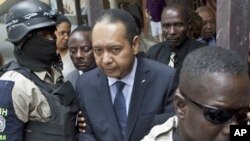Haitian police escorted former dictator Jean-Claude Duvalier from a luxury hotel in Port-au-Prince Tuesday, two days after Duvalier's surprise return to the country after nearly 25 years in exile.
Authorities in Haiti have charged former dictator Jean-Claude Duvalier with corruption, theft and misappropriation of funds, two days after he made an unexpected return to his homeland after 25 years in exile in France.
Duvalier, who was not wearing handcuffs, waved to a crowd that had assembled outside the Hotel Karibe as police led him to a waiting car Tuesday.
Rights issues
Human rights groups, such as Amnesty International and Human Rights Watch, are urging Haitian authorities to prosecute Duvalier for abuses committed during his 15-year rule, which ended with a popular uprising in 1986.
Rupert Colville, a spokesman for the U.N. High Commissioner for Human Rights, told reporters in Geneva Tuesday that Duvalier's surprise return to Haiti brings up issues of accountability and impunity. "It's not clear if Haiti is in a position to arrest and charge Jean-Claude Duvalier for anything at this point, but it's something we are looking into right now," he said.
Colville said it is conceivable that charges could be filed. "There are major issues surrounding him such as [a] considerable range of human rights abuses that took place in Haiti during the 15 years he was in power, especially by the Tontons Macoutes, [and] also, of course, other issues such as corruption," he said.
History
Duvalier, known as "Baby Doc," assumed power in 1971 at the age of 19, upon the death of his father, Francois "Papa Doc" Duvalier. The elder Duvalier was elected president in 1957 and later declared himself "president for life."
The regime of both Duvaliers was characterized by repression and the use of a paramilitary force known as the Tontons Macoutes, which brutally cracked down on the Haitian people.
In recent years, the World Bank has commended Haitian and Swiss officials for their attempts to recover about $6 million in allegedly stolen assets that are held by the Duvalier family in Swiss banks. Authorities say those assets have been frozen since 1986.
Jean-Claude Duvalier has not publicly explained his reasons for returning to his homeland after nearly 25 years in exile. He had been expected to hold a news conference Tuesday.
U.S. State Department Spokesman P.J. Crowley told reporters in Washington that the United States did not know about Duvalier's return in advance. Crowley said the French government first notified U.S. officials about an hour before Duvalier's plane landed in Port-au-Prince Sunday.
Crowley called Duvalier's return "one more complication" in an already challenging situation. "If I look at the list of challenges that Haiti faces today, having a former dictator return to Haiti just adds to Haiti's ongoing burden. But, as to his [Duvalier's] status in the country and what happens, this is a matter for the government of Haiti and the people of Haiti," he said.
Crowley said he understood that Duvalier was meeting with Haitian government and legal officials Tuesday afternoon.
Speaking in broad terms, White House Spokesman Robert Gibbs told reporters that current or former political actors should not be focused on themselves, but on the best outcome for the Haitian people.
Duvalier's return comes at a time of turmoil in Haiti. The country is contending with November's disputed elections, last January's massive earthquake that ravaged the capital and killed more than 200,000 people, and an ongoing cholera epidemic that has claimed more than 3,000 lives.




